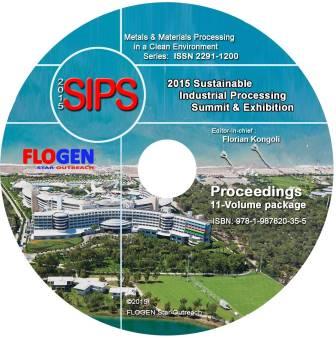2015-Sustainable Industrial Processing Summit
SIPS 2015 Volume 7: Ionic Liquids & Energy Production
| Editors: | Kongoli F, Gaune-Escard M, Mauntz M, Rubinstein J, Dodds H.L. |
| Publisher: | Flogen Star OUTREACH |
| Publication date: | 23 December 2015 |
| Pages: | 310 pages |
| ISBN: | 978-1-987820-30-0 |
| ISSN: | 2291-1227 (Metals and Materials Processing in a Clean Environment Series) |

< CD shopping page
The Electrical Conductivity of Molten ZnCl2, BeCl2, PbCl2 AND CdCl2 at Elevated Temperatures
Alexei Potapov1; Alexander Salyulev1;1INSTITUTE OF HIGH TEMPERATURE ELECTROCHEMISTRY, Ekaterinburg, Russian Federation;
Type of Paper: Regular
Id Paper: 179
Topic: 13
Abstract:
The cell for measuring an electrical conductivity of molten salts at temperatures as high as 1500 K and vapor pressures of salts up to several tons of atmospheres was designed. The electrical conductivity of the molten ZnCl2, BeCl2, PbCl2 and CdCl2 was measured at temperatures as high as 1421, 823, 1320 and 1474 K, respectively, which is by 280, 62, 307 and 273 K higher than the temperature values previously achieved. The rate of conductivity rise for the melts decreases with temperature.
The technique for the density data elongate extrapolation, which considers the non-linear decrease in density at high temperatures (near and beyond boiling point), was proposed; molar conductivities were calculated for the same temperatures for the first time. Some correlations between the physical-chemical properties of these salts are suggested. The totality of our and literature data allows one to draw out some conclusions regarding structural changes in the melts, being studied, with temperature.
This research was partially supported by the Russian Ministry of Education and Science through Targeted Federal Program (project number: 14.607.21.0084).